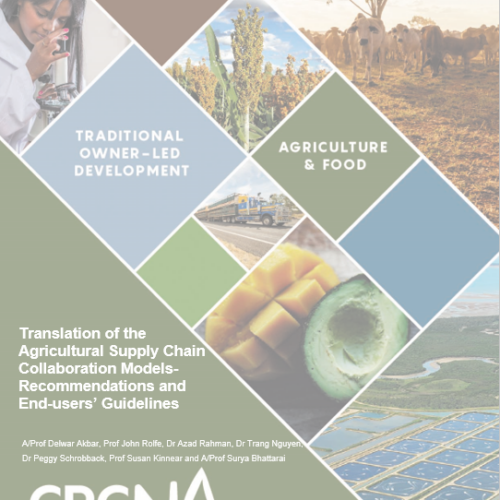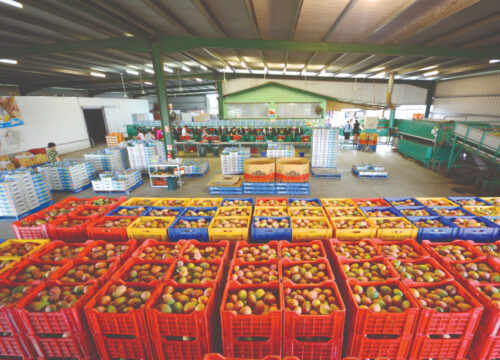
- Author Akbar, D., Rolfe, J., Rahman, A., Nguyen, T., Schrobback, P. Kinnear, S., and Bhattarai, S
- Publish date 14 March 2022
- Type Report
- ISBN 978-1-922437-30-3
- Documents
- Horticulture
- Strategic policy development
- Supply chain development
Summary
The Exporting perishable commodities research team has developed a supply chain collaboration model for three selected horticulture industries: mango, avocado, and lychee.
This report is the translation of the research findings of the project, focusing on basic questions of why, who, how and what in relation to implementing the collaboration models in selected industries. A set of themes has emerged through an inductive qualitative analysis approach. Based on the identified themes, some recommendations have been made for the relevant stakeholders and actors in the ASCC. The key recommendations are:
- Developing a culture and environment of ASCC through information sharing and network building is essential for sustainable ASCC. Retaining collaboration partners is also crucial for sustainable ASCC and considerable for developing ASCC. Building and maintaining trust as well as risk-sharing are key for retaining collaboration partners and ensuring sustainable ASCC.
- Leadership in ASCC is important. However, all actors involved in the ASCC need to understand their contribution towards the collaboration and act accordingly in order to ensure the success of the collaboration.
- Leadership and business management skills could be enhanced through supply chain-focused short courses and the involvement of industry working groups. Attaining this goal could be challenging due to the lack of multi-level training programs and the different education levels of supply chain actors.
- It is difficult for producers to attend a training program to boost up their business skills due to their work commitment at the farm. It is recommended that cross-sector mentoring programs and on-farm face-to-face training could be beneficial for this cohort.
- Government support in the forms of network building and subsidisation is vital for the success of ASCC. Government subsidy on air freight could trigger the ASCC to reach the export market.
- Formal agreements and contracts among ASCC partners may or may not be important, depending on the nature of the collaboration. Formal agreements and contracts with overseas partners in export focused ASCC depend on the culture and norms of the participating countries.
- Given the COVID-19 and post COVID-19 situation, financial support from the government may not be obtainable for supporting ASCC. However, the government and industry could work together in transforming and restructuring supply chains to reach export markets.
Projects
Exporting perishable commodities to Asia: Developing a stakeholder collaboration model
Coordination through the supply chain between growers, processors, marketers and transporters is the main impediment to exporting perishable commodities to Asian markets. Developing strong ties with those Asian markets is critical for expansion and development of perishable commodities in Northern Australia. This project examined stakeholder collaboration in planning and investment for exporting high value perishable agricultural commodities (HVPACs) from Northern Australia to Asian markets. Exploration was undertaken of multi-party collaborations in producing and processing perishable commodities, developing and enabling supply chain infrastructure as well as identifying policy and regulatory barriers to investment in this sector. The research approach combined a literature review, two stakeholder workshops, a farmer survey in Queensland, a consumer choice survey in China and spatial-modelling for volumes of HVPACs in CQ region. The stakeholder workshops examined the types and processes of collaboration suitable for HVPACs with regard to processing, investment and international trade mechanisms. In addition, technological innovation or adaptation, appropriate logistics and supply chain management were also examined. The final summary report outlines the five key objectives set for the project and aims to summarise all the finding and strategic recommendations with end user guidelines based on recommendations. This framework will be applicable to all regions within Northern Australia. Conference papers (published) Australia New Zealand Regional Science Associations International (ANZRSAI ) 2019. Cairns, Queensland, Australia. Rahman, A., Akbar, D., Rolfe, J.(2019). Every community wants an airfreight facility: is this a viable regional agricultural supply chain development option for central Queensland in Australia? Akbar, D., Rahman, A., Rolfe, J., Kinnear, S., Schrobback, P., Bhattarari, S. (2019). Working to grow together: horizontal collaboration for horticulture production in Queensland.


